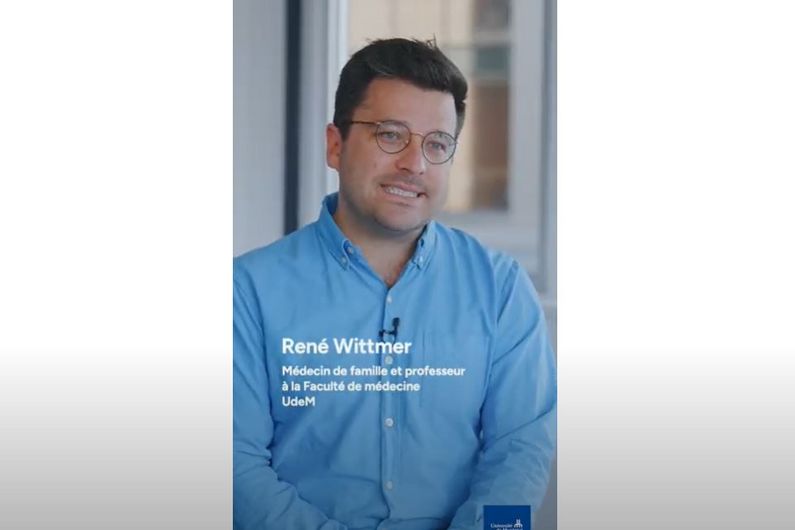Everyone has heard of menopause but what about its long-neglected male cousin, andropause? Men also experience hormonal changes with age. And just as menopause is more freely discussed today than it once was, andropause is coming out of the shadows.
"It's the logical next step: we're bringing attention to bear on the subject in men," said Dr. Hélène Lavoie, an endocrinologist and clinical assistant professor in the Department of Medicine at Université de Montréal. She has been practicing at the Centre hospitalier de l'Université de Montréal (CHUM) for 30 years and is one of the few experts on andropause in Quebec.
Lavoie warns against the popular misconception that andropause is the male equivalent of menopause.
"The term is misleading," she said. "Unlike menopause, which causes estrogen levels to plummet in most women between the ages of 45 and 55, andropause is a gradual and uneven decline in testosterone in men starting around age 30."
Lavoie prefers to speak of acquired hypogonadism in aging men, a less catchy term but one she says more accurately describes the medical reality.
Not just a question of age
At what point does a drop in testosterone become a problem? It's hard to say. The pituitary hormones that control testosterone secretion and fertility-luteinizing hormone (LH) and follicle-stimulating hormone (FSH)-are released in pulses and are very sensitive to external variations. "The reproduction pathway is extremely fragile," Lavoie explained.
People often think that a decline in testosterone is invariably due to aging, but in fact only 2 per cent of cases of hypogonadism are caused by age alone, according to Lavoie. Many other factors can be involved: diabetes, obesity, stress, depression, pituitary disorders, medication.
"Before you call it andropause, you have to look for the underlying cause," said Lavoie. "I often re-evaluate men who were hastily given high doses of testosterone without determining the reasons for the decrease in their hormone levels. I sit down with them, review their clinical history and we go back to square one."
It is important to bear in mind that andropause, like menopause, is not a disease, Lavoie said: "It's a natural aging process, which may require support in men if the drop in testosterone is accompanied by a clinical syndrome."
Signs to look for
Fatigue, low energy, irritability, difficulty concentrating and insomnia are general signs that can indicate hypogonadism but there are more specific symptoms to look for, such as loss of libido, erectile dysfunction, disappearance of morning erections, slowing of beard growth and breast development.
These clinical syndromes warrant further investigation, as untreated hypogonadism can lead to serious complications including anemia, premature osteoporosis, increased cardiovascular risk, muscle loss and abdominal fat accumulation.
For many men, especially those nearing the end of their working lives, the problem is temporary. "They're approaching retirement, they're tired, worn out, stressed. Stress inhibits gonadotropin-releasing hormone, or GnRH, which is the hormone that regulates sexual maturation and fertility, and the men's testosterone decreases," Lavoie explained.
"I do a complete work-up. If other causes are eliminated, I diagnose acquired hypogonadism in aging men and treat it, but not forever. I tell them: in five years, we'll reassess. Often, a year after retirement, they don't need it anymore. They're sleeping better, getting more exercise and taking better care of themselves. Lower testosterone may just be related to lifestyle."
Multiple tests needed
The decision to treat testosterone deficiency is never taken lightly, said Lavoie, and never on the basis of a single test: "We repeat the blood test two or three times and also do a complete work-up."
A low reading isn't enough: it needs to be interpreted in a clinical context, with tests tailored to each patient. In general, a testosterone level between 10 and 30 nanomoles per litre is considered normal. Between 7 and 12 is borderline. Below 7, treatment may be considered, but only after a thorough evaluation.
According to recent studies, the current treatments-weekly subcutaneous injections of testosterone or testosterone gel or cream-have modest benefits and carry risks.
Lavoie is worried about the normalization of testosterone supplementation, especially in young men. "Testosterone therapy should not be prescribed systematically," she said. "Our biggest concern is young men taking testosterone to train, grow a beard or build muscles. I tell them to trust their bodies but the social pressures are enormous. Anabolic steroids can have irreversible impacts on their fertility."
Small changes are important
So her advice for men whose libido is flagging, along with their energy, muscles, concentration and mood, is be patient, give yourself a break, let go of performance anxiety and don't spend too much time on social media.
"I often tell my patients: if you had a libido in the past, don't worry, it'll come back," said Lavoie. "Libido is multifactorial: it works in men and women when everything else in their lives is working. Small changes can make a big difference."
Lavoie also pointed out that hormone therapy doesn't come with a guarantee: "The effect varies considerably from person to person. It's not like a drug that lowers blood pressure or blood sugar."
With the renewed interest in menopause in women and andropause in men, it will be more important than ever for the doctors of the future to know not just the clinical side but also how to discuss sexual health openly with their patients, Lavoie believes. Training the next generation of medical professionals in hormonal health is therefore a challenge.
"Lower testosterone is a normal part of aging and does not require systematic screening," said Lavoie. "We need to avoid pathologizing a natural phenomenon and learn to identify the cases that require intervention in order to treat the right people at the right time."








